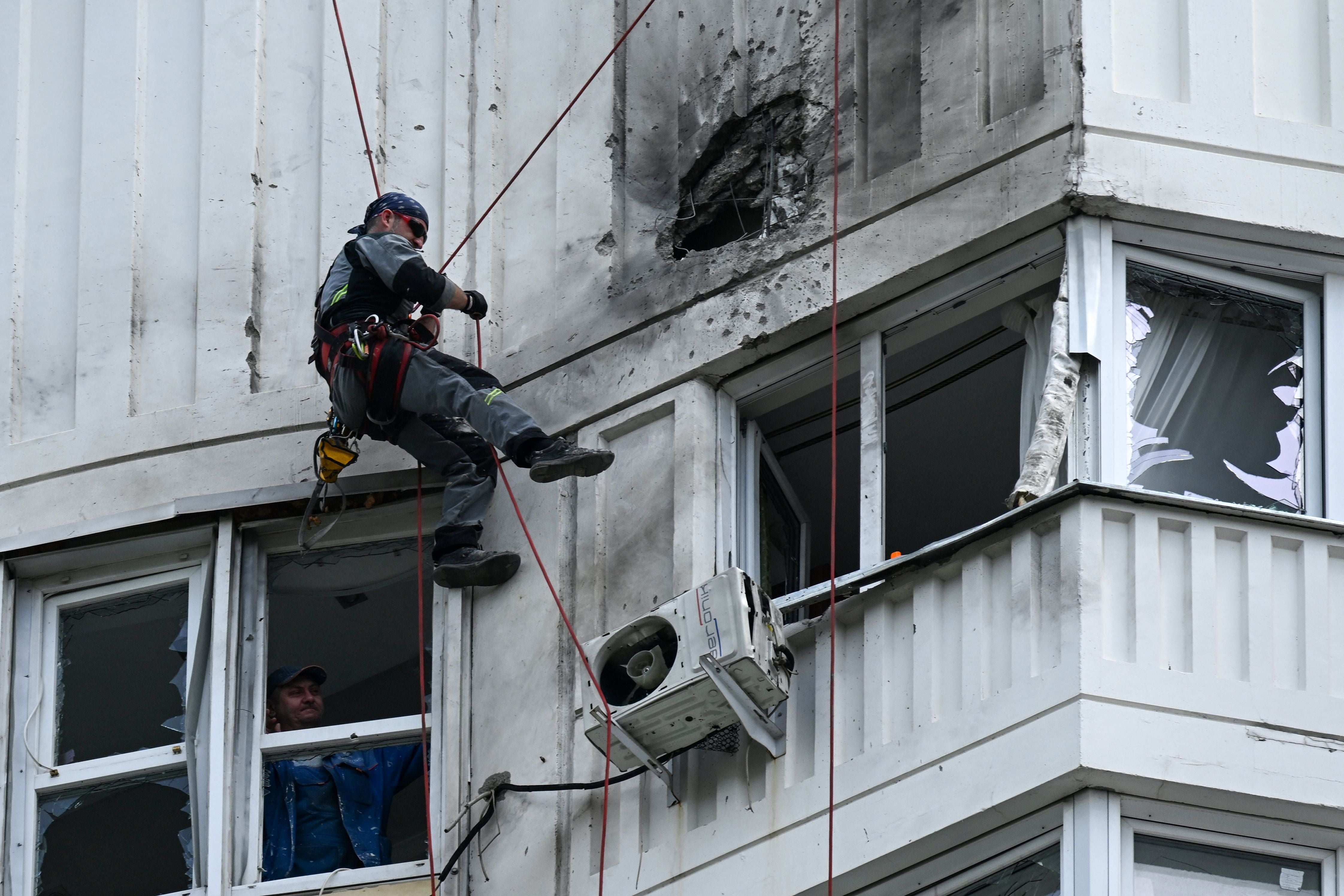Drones, bombs and raids: Why Ukrainian attacks on Russian territory are only the beginning
British and US officials acknowledge privately that Ukraine has carried out secret cross-border operations with rising success, writes Kim Sengupta


This morning’s attack on Moscow, reportedly by a swarm of up to 30 drones, demonstrates Ukraine’s increasing capacity, and willingness, to take the war to the Russian capital.
This is not the first such assault. The Kremlin was hit by drones three weeks ago. Senior Western security officials described to me how they believed that airstrike, exposing an embarrassing vulnerability at the heart of Vladimir Putin’s power, had been carried out.
According to their account, four drones, carrying small explosive payloads, were launched from a wooded area outside Moscow. One was detected by air defences and destroyed. Two got through to the target before being shot down, one possibly by rifle fire from the ground.
The mission was carried out, they claimed, on behalf of Ukraine, by anti-government Russians who have been successfully cultivated by Kyiv. There was, the officials wanted to stress, no Western assistance or encouragement for the operation.
The Russian government has blamed Ukraine for the latest attack, as it did for the one on the Kremlin. Kyiv denied responsibility, as it had done in relation to the Kremlin raid.
The Ministry of Defence in Moscow declared that the “act of terrorism” was foiled, with the drones being “neutralised” through the use of anti-aircraft fire by Pantsir systems and signal-jamming technology.
Mykhailo Podolyak, an adviser to the Ukrainian president Volodymyr Zelensky, said: “We have nothing to do with this, but we watch with pleasure increasing numbers of attacks, and forecast there’ll more.” He added, with a smile: “Maybe it was a Russian drone, fired at us, which decided to come back home.”
The Moscow strikes this morning came after two days of intense Russian drone attacks on Kyiv, and 24 hours after Kyrylo Budanov, the head of the Ukrainian military intelligence service (the HRU), vowed retribution.
Ukraine’s Western allies have, in the past, publicly backed Kyiv’s denials of attacks inside Russian territory, with officials, including some in London, suggesting they may have been “false flag operations” carried out by the Kremlin to justify further attacks on civilian targets in Ukraine.
American and British officials now acknowledge privately that the Ukrainians, with the aid of anti-Kremlin groups in Russia, are carrying out secret cross-border operations with increasing success.
Western intelligence agencies are seldom told in advance of these missions. Even within Ukraine, say British and American officials, it is unclear who exactly knows what, with different branches of security running their own, sometimes overlapping, operations. The Security Service of Ukraine, the Main Directorate of Intelligence and the Ukrainian military, for example, all field their own special forces units.
Mr Zelensky and his inner circle would not necessarily have knowledge of all such operations, as the services have a large degree of autonomy of action. This also allows the Ukrainian president the advantage of plausible deniability afterwards.
Among Pentagon documents leaked last month was a classified CIA report stating that Ukrainian military intelligence “had agreed, at Washington’s request, to postpone strikes” on Moscow in the run-up to the first anniversary of the war in February.
The report added, however, that “there’s no indication” that Ukraine’s security agency, the SBU, had also “agreed to postpone its own plans to attack Moscow around the same date”. A week after the anniversary, the Kremlin accused Kyiv of attempting to carry out drone strikes on infrastructure near Moscow.
Mr Budanov, the 37-year-old head of the HRU, has been more forward than his colleagues in Kyiv about clandestine Ukrainian operations. Asked last week about a series of assassinations inside Russia, he responded: “We have already successfully targeted quite a few people. There have been well-publicised cases everyone knows about, thanks to the media coverage.”
Daria Dugina, a 29-year-old journalist and political activist, was killed in a car explosion in Moscow in August 2022. The intended target was believed to have been her father Alexander Dugin, a nationalist ideologue, although Dugina herself had links with Yevgeny Prigozhin, the founder of the Wagner Group, whose mercenaries are fighting in Ukraine. She was the editor of a website called United World International, owned by Mr Prigozhin.
Vladlen Tatarsky (whose real name is Maxim Fomin), a 40-year-old military blogger and Prigozhin ally, was killed by a bomb hidden in a statuette at a St Petersburg cafe in April. Russian prosecutors arrested 26-year-old Darya Trepova, who they claim worked for Alexei Navalny, the jailed critic of Mr Putin. They have issued an arrest warrant for Yuriy Denisov, a Ukrainian citizen who, they also claim, tracked Tatarsky’s movements.
Two weeks ago, Zakhar Prilepin, a 47-year-old pro-Kremlin activist, was left with multiple injuries in a car bombing. Russian police say they have captured the bomber, 30-year-old Alexander Permyakov, who they claim has confessed to being recruited by Ukrainian intelligence.
Incursions into Russian territory, such as the one in the Belgorod region last week by armed groups of Russian exiles, have now been added to Ukraine’s cross-border missions involving drones in the air and bombs on the ground.
There is no reason to think these will not continue. Indeed, with the war entering a critical stage, they are likely to escalate – with the Russian people increasingly feeling the blowback from Mr Putin’s “special military operation” in Ukraine. We will have to see whether this increases opposition to the government, or reinforces nationalist sentiment to back the conflict.






Join our commenting forum
Join thought-provoking conversations, follow other Independent readers and see their replies
Comments